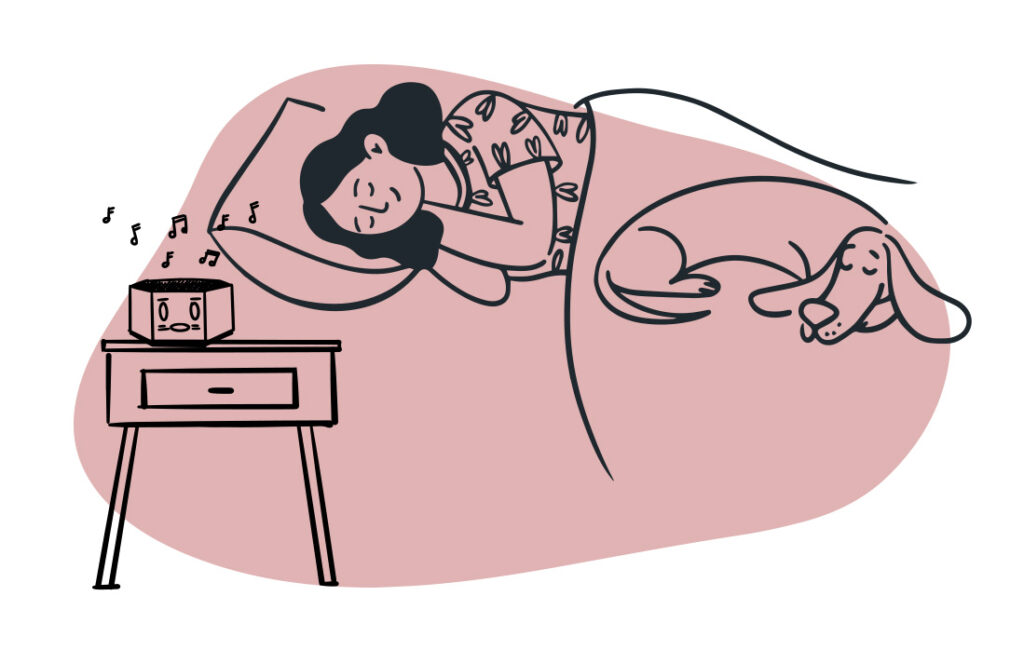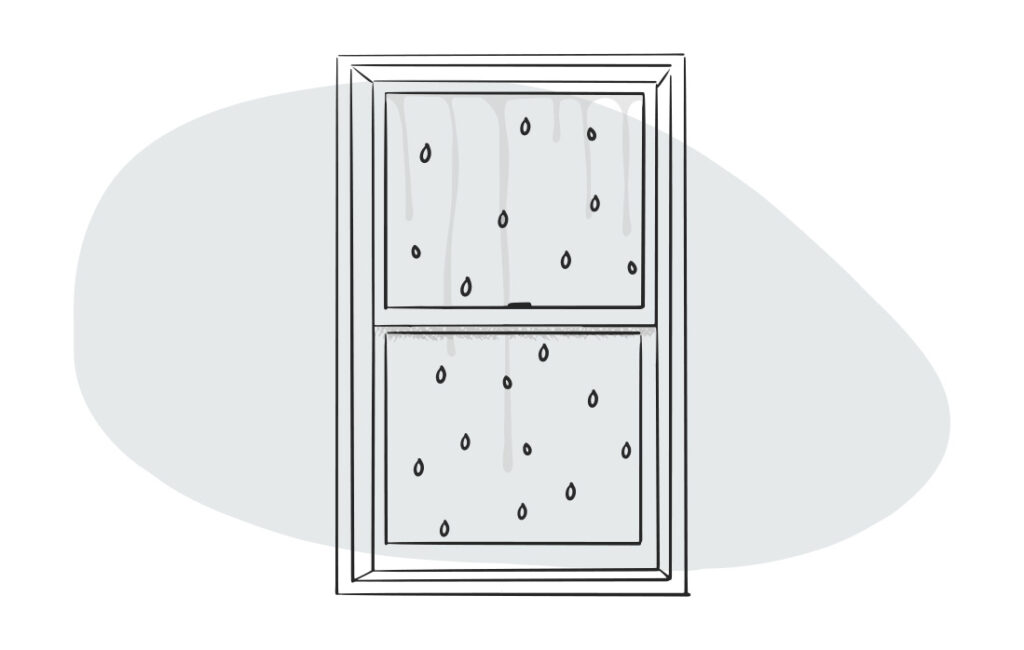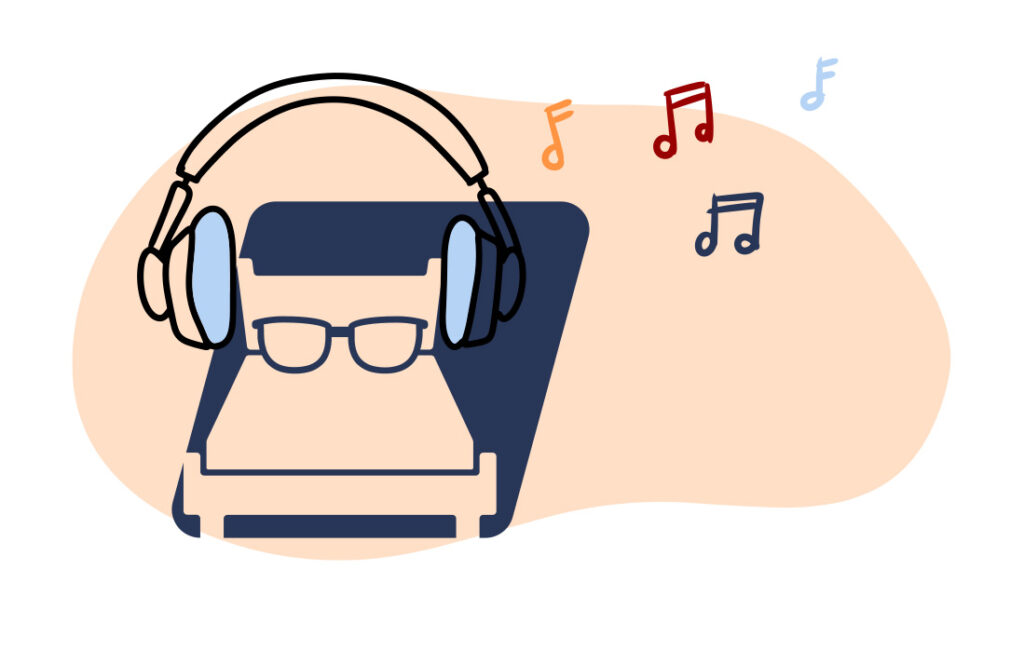Best Sounds For Sleep: White Noise? Nature?
Disclosure: By clicking on the product links in this article, Mattress Nerd may receive a commission fee at no cost to you, the reader. Read full disclosure statement.
Even adults need lullabies sometimes. Listening to music or soothing sounds might help you fall asleep faster. They also promote better overall sleep quality and sleep duration. However, not all sounds offer the same perks.
Here’s a detailed guide on the best music, noises, and sounds for sleep.
What Are Sleep Sounds?
Some environmental noises — like annoying neighbors or loud traffic — can have a negative effect on sleep. However, other sounds can calm the mind, relax the body, relieve stress, and help you get some high-quality rest.
Some folks find that listening to certain music, sounds, or noise can help them drift off and keep them in dreamland. Some popular options include:
- white noise
- pink noise
- brown noise
- binaural beats
- ASMR
- nature sounds
- water sounds
Just remember that not all sounds are the same. Different sleep sounds offer different benefits that affect how well you sleep.

Music and Sleep Quality
Research shows that listening to music before bed can promote quality sleep in a variety of ways. Here’s how.
Influences sleep hormones
Listening to music can have an impact on the body’s hormones. It’s been shown to increase mood-boosting chemicals in the brain such as serotonin, dopamine, and oxytocin. When these hormones function correctly, they help promote a regulated sleep-wake cycle and high-quality sleep.
Additionally, studies show that listening to music can decrease cortisol levels. This stress hormone can increase alertness, making it harder for you to fall and stay asleep.
Reduces pain
Research suggests that certain sounds or music can help reduce physical pain. This can be very beneficial since chronic pain or discomfort can make it difficult to get a good night’s rest.
According to a 2014 study, music has an analgesic effect that can distract you from pain. Another study noted that music can help release endorphins or change catecholamine levels, which can reduce pain levels and lower stress.
Relaxes autonomic nervous system
Music has been found to calm the autonomic nervous system (ANS).The ANS helps control your body’s unconscious processes — like your heartbeat, breathing, and digestion. So, music could help lower your heart rate, slow your breathing, and reduce blood pressure. All of these things can have a positive effect on sleep quality. Interestingly, weighted blankets can also have this effect.
It’s also worth noting that music can promote better sleep at any age. A 2013 study found that gentle rhythms and lullabies helped lower the heart rate of baby participants, which prompted better sleep.
Does type of music matter?
There’s some evidence to suggest that certain music (e.g. binaural beats) works better to induce REM sleep than other genres. Some researchers also claim that relaxing music is more beneficial than rhythmic music. However, we need more evidence to know for sure.
In most cases, the type of music that works best depends on a person’s individual tastes. A 2018 review analyzed the type of music participants listened to to help them sleep. Classical music was the most popular genre, but lots of folks also listened to rock, pop, acoustic, jazz, ambient, and even metal.
It’s also important to note that certain music could disrupt sleep. According to a 2021 study, listening to familiar songs can cause involuntary muscle imagery (aka earworms). This is that familiar feeling of when a person wakes up from their sleep because a song they heard before bed is stuck in their head. Looking at you, TikTok.
That said, it’s best to opt for music that you find relaxing. You should also avoid music that brings up negative feelings or increases your energy levels.
Some folks prefer to listen to music for an hour or so before sleep, while others like to listen to it throughout the night. However, it might be a good idea to turn the music off before you drift off if you think the sounds will wake you up.
Again, it all depends on what works best for you.

Types of Noise for Sleep
Each type of sleep noise has a unique set of benefits, some more proven than others. Here’s a rundown of the three most popular types of sleep noise: white noise, pink noise, and brown noise.
White Noise
White noise is a mix of noises that creates a single sound. Energy is distributed equally across all audible frequencies. This leads to a consistent humming sound. Some examples of white noise include:
- vacuum
- whirring fan
- humidifier
- running water
- air conditioner
- hissing radiator
- TV or radio static
- shushing sounds
You can also buy a white noise machine or get a white noise app on your phone.
White noise can be very beneficial if you live in a noisy area. Because all frequencies are on the same level, it can drown out loud sounds that spark brain activity.
Some studies also show it can be used as a complementary treatment for insomnia or other sleep disorders. However, we need more research to understand the full range of benefits.
Pink Noise
Pink noise contains all audible frequencies. But unlike white noise, the energy isn’t distributed evenly across them. Pink noise is more intense at lower frequencies, which is why it has a deeper sound than white noise. For many, pink noise is even-, flat-, and low-sounding.
Some examples of pink noise include:
- wind
- steady rainfall
- leaves rustling in trees
- waves crashing on a beach
According to a small study, pink noise can help reduce brain waves which promotes stable sleep. Another study found a positive association between pink noise and deep sleep. This might benefit cognition and memory. However, we need more evidence to show how well pink noise works for overall sleep quality and sleep duration.
Brown Noise
Brown noise, sometimes called red noise, has higher energy at lower frequencies. That means it’s deeper than white or pink noise. Low tones are louder and high pitched sounds are softer. However, white and brown noises often sound similar to the human ear.
Some examples of brown noise are:
- thunder
- low roaring
- strong waterfalls
- heavy crashing waves
There aren’t enough scientific studies to show how well brown noise works for sleep. However, some anecdotal reports claim it can promote relaxation and induce a restful state.
Best Sleep Sounds
Here’s how sleep sounds — such as ASMR, nature sounds, and water sounds — can benefit your sleep sessions.
ASMR
Autonomous Sensory Meridian Response (ASMR) is a tingling sensation that starts at the head and travels throughout other areas of the body. These feelings are initiated by a range of audio-visual triggers, typically slow and gentle sounds. Some popular triggers are:
- writing
- typing
- tapping
- blowing
- drinking
- chewing
- crinkling
- brushing
- humming
- scratching
- whispering
- page-turning
You can also experience tactile ASMR. This is when you have an in-person ASMR session, where someone can physically touch you. They might use a feather or makeup brush to lightly trace your skin, or gently scratch their fingernails across your back.
Since ASMR is a relatively new concept, there isn’t a lot of research to prove its perks. One study suggests it might serve as a sleep aid while promoting well-being, but we don’t know for sure just yet.
Nature Sounds
Nature sounds are any non-artificial sounds found in the natural world. This could be:
- rainfall
- waterfalls
- bird songs
- whale songs
- ocean waves
- frogs ribbiting
- a fire crackling
- crickets chirping
- wind blowing through trees
Several studies show that listening to nature sounds can have a positive effect on mental health and wellness. In turn, it could help improve sleep quality. Nature sounds might be particularly helpful for those who live in an area where there’s a lot of artificial noise.
During a 2017 study, researchers analyzed the differences between artificial sounds and nature sounds on participants’ sleep. They found that nature sounds led to outward-focused brain attention. This is the opposite of inward-focused attention which has been linked to stress, depression, and anxiety.
Researchers from the 2017 study also noted that participants’ nervous systems were more relaxed after listening to nature recordings.
Water Sounds
Water sounds are a fan favorite for a reason. Listening to babbling brooks, pouring rain, or stormy seas can be deeply relaxing. Water sounds can also counteract abrupt noises like barking dogs, a partner’s snoring, or your neighbor’s super loud alarm going off.
Moreover, water sounds might help your mind and body prepare for sleep. According to a 2018 study, water sounds can help reduce the sympathetic response while increasing the parasympathetic response. That means that listening to water sounds might help you get into a “rest and digest” mode instead of a “fight or flight” mode.
Final Thoughts
Listening to music before bed has been shown to have a positive effect on sleep. Specifically, it can influence sleep hormones, reduce pain, and relax the autonomic nervous system. However, not all music works the same. Stick to soothing songs or melodies that promote relaxation, and avoid anything agitating or energizing.
In addition to music, there’s a wide range of noises and sounds that help promote a good night’s sleep. Popular options include:
- white noise
- pink noise
- brown noise
- autonomous Sensory Meridian Response (ASMR)
- nature sounds
- water sounds
It might take some trial and error to figure out which sounds work best for you, but try to be patient with the process. Also note that noises aren’t a cure all. You should still maintain healthy sleep habits like following a consistent sleep schedule for good sleep hygiene. If you’re experiencing any problems sleeping through the night, talk with your doctor.

Mattress Nerd’s Sleep Sounds Playlist
There are thousands of online sleep sounds and playlists to pick from. This can make finding the right ones for you overwhelming and frustrating. But don’t worry! We combed through the internet so you don’t have to.
Here’s our list of the best noises and sounds for all sleep styles:
White Noise
- https://youtu.be/d_Yv2vNoO2c
- https://open.spotify.com/episode/7bVRUupN2elEeJKSWgea3y?si=uxqSU8UxR6-f3Hg0UZlufQ
Brown Noise
- https://open.spotify.com/track/71ky6PqalRHRYxv1KZ02C6?si=5bca1b7fe1ce4687
- https://open.spotify.com/show/0Fx4mPbaizitTKwpZqYG0j
- https://open.spotify.com/playlist/37i9dQZF1DWV90ZWj21ygB?si=4af58a83aa394aa2
- https://youtu.be/xsfyb1pStdw
Pink Noise
- https://open.spotify.com/track/18aGDOpPblt4w29uE9NMbd?si=dc587dc16d674833
- https://open.spotify.com/playlist/37i9dQZF1DWZhzMp90Opmn?si=9080eb8f90834520
- https://open.spotify.com/playlist/37i9dQZF1DXbcPC6Vvqudd?si=96d8094c0eb84a67&nd=1
Music and Meditation
- https://youtu.be/N01rtJZX05s
- https://open.spotify.com/track/4BMHp3DkI8VLsuB9Kr0pzu?si=dd8f1440e6cd4c37
- https://open.spotify.com/album/4fTY6QEKaCbjXRA8m7iZyA?si=pa3NLqbFQFeeiekbx7bbZQ
- https://open.spotify.com/show/0edOBjruWV6Juxf42WjGxw?si=52ebbe88316a46ab&nd=1
FAQs
Where can I listen to music for sleep?
You can find sleep music or noise on streaming services such as YouTube, Spotify, Apple Music, or Pandora. You can also purchase a white noise machine like the Hatch Restore. Another easy option is to download a meditation or sleep app. Many offer a wide variety of sleep-inducing noises, sounds, and music.
Which color of noise is best for sleep?
Some studies suggest pink noise promotes the most sound sleep. However, the best color of noise for sleep is the one that works best for you after some experimentation.
Should I sleep with headphones on?
Wearing headphones before sleep can be a great way to wind down. However, you shouldn’t fall asleep while wearing them. Wearing headphones to sleep can increase the risk of hearing loss, ear canal irritation, and wax buildup. Plus, falling asleep with headphones on can make it harder to notice the signs of a fire, medical concern, or other emergency situations.
Should you listen to sleep sounds all night?
You can sleep with sounds all night if it works for you. Sleeping with sounds on all night might be a distraction for some, but a benefit to others. However, in general, noises at night are known to wake people up and may cause a more fragmented night’s sleep.
Sources
Does listening to calming music at bedtime actually help you sleep? (2021). https://www.healthinaging.org/blog/does-listening-to-calming-music-at-bedtime-actually-help-you-sleep
Dubey P, et al. (2019). Effect of music of specific frequency upon the sleep architecture and electroencephalographic pattern of individuals with delayed sleep latency: A daytime nap study. https://www.ncbi.nlm.nih.gov/pmc/articles/PMC6924256
Ellis RJ, et al. (2010). Music and autonomic nervous system (dys)function. https://www.ncbi.nlm.nih.gov/pmc/articles/PMC3011183
Garza-Villarreal EA, et al. (2014). Music reduces pain and increases functional mobility in fibromyalgia. https://www.frontiersin.org/articles/10.3389/fpsyg.2014.00090/full
Gould van Praag CD, et al. (2017). Mind-wandering and alterations to default mode network connectivity when listening to naturalistic versus artificial sounds. https://www.nature.com/articles/srep45273
Holden R. (2013). Music: A better alternative than pain? https://www.ncbi.nlm.nih.gov/pmc/articles/PMC3782778
Hume KI, et al. (2012). Effects of environmental noise on sleep. https://pubmed.ncbi.nlm.nih.gov/23257581
Koelsch S, et al. (2011). Effects of music listening on cortisol levels and propofol consumption during spinal anesthesia. https://pubmed.ncbi.nlm.nih.gov/21716581
Loewy J, et al. (2013). The effects of music therapy on vital signs, feeding, and sleep in premature infants. https://pubmed.ncbi.nlm.nih.gov/23589814
Low P. (2022). Overview of the autonomic nervous system. https://www.merckmanuals.com/home/brain,-spinal-cord,-and-nerve-disorders/autonomic-nervous-system-disorders/overview-of-the-autonomic-nervous-system
Luo J, et al. (2021). The effects of using a nature-sound mobile application on psychological well-being and cognitive performance among university students. https://www.ncbi.nlm.nih.gov/pmc/articles/PMC8651610
Papalambros NA, et al. (2017). Acoustic enhancement of sleep slow oscillations and concomitant memory improvement in older adults. https://www.frontiersin.org/articles/10.3389/fnhum.2017.00109/full
Poerio G. (2016). Could insomnia be relieved with a YouTube video? The relaxation and calm of ASMR. https://www.ncbi.nlm.nih.gov/books/NBK453209
Poerio GL, et al. (2018). More than a feeling: Autonomous sensory meridian response (ASMR) is characterized by reliable changes in affect and physiology. https://www.ncbi.nlm.nih.gov/pmc/articles/PMC6010208
Scullin MK, et al. (2021). Bedtime music, involuntary musical imagery, and sleep. https://journals.sagepub.com/doi/full/10.1177/0956797621989724
Speranza L, et al. (2022). Music affects functional brain connectivity and is effective in the treatment of neurological disorders. https://pubmed.ncbi.nlm.nih.gov/35325516
Thoma MV, et al. (2018). Preliminary evidence: the stress-reducing effect of listening to water sounds depends on somatic complaints. https://www.ncbi.nlm.nih.gov/pmc/articles/PMC5842016
Trahan T, et al. (2018). The music that helps people sleep and the reasons they believe it works: A mixed methods analysis of online survey reports. https://www.ncbi.nlm.nih.gov/pmc/articles/PMC6235300
Understanding how sound suppresses pain. (2022). https://www.nih.gov/news-events/nih-research-matters/understanding-how-sound-suppresses-pain
Zhou J, et al. (2012). Pink noise: Effect on complexity synchronization of brain activity and sleep consolidation. https://pubmed.ncbi.nlm.nih.gov/22726808
Yoon H, et al. (2022). External auditory stimulation as a non-pharmacological sleep aid. https://www.ncbi.nlm.nih.gov/pmc/articles/PMC8838436